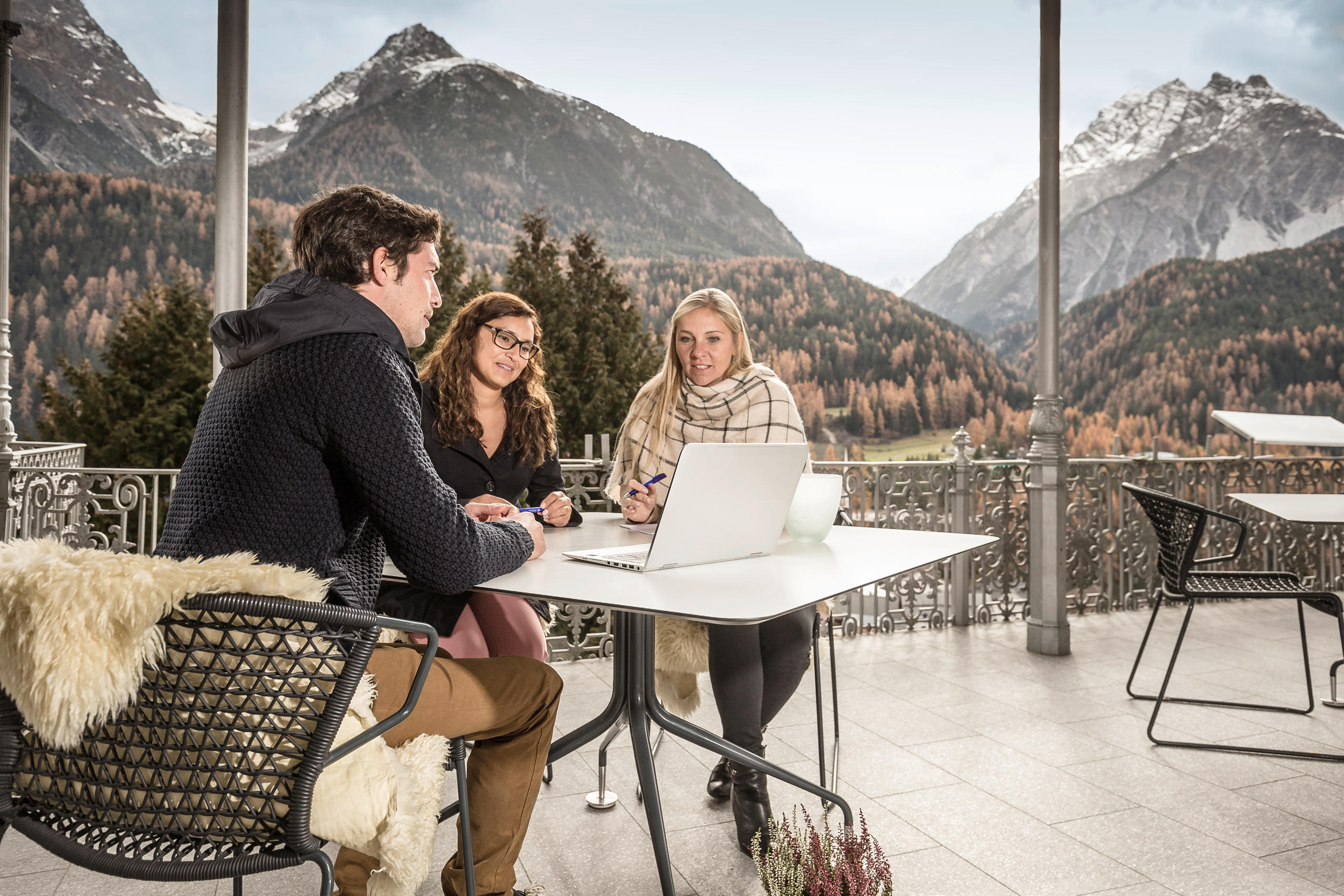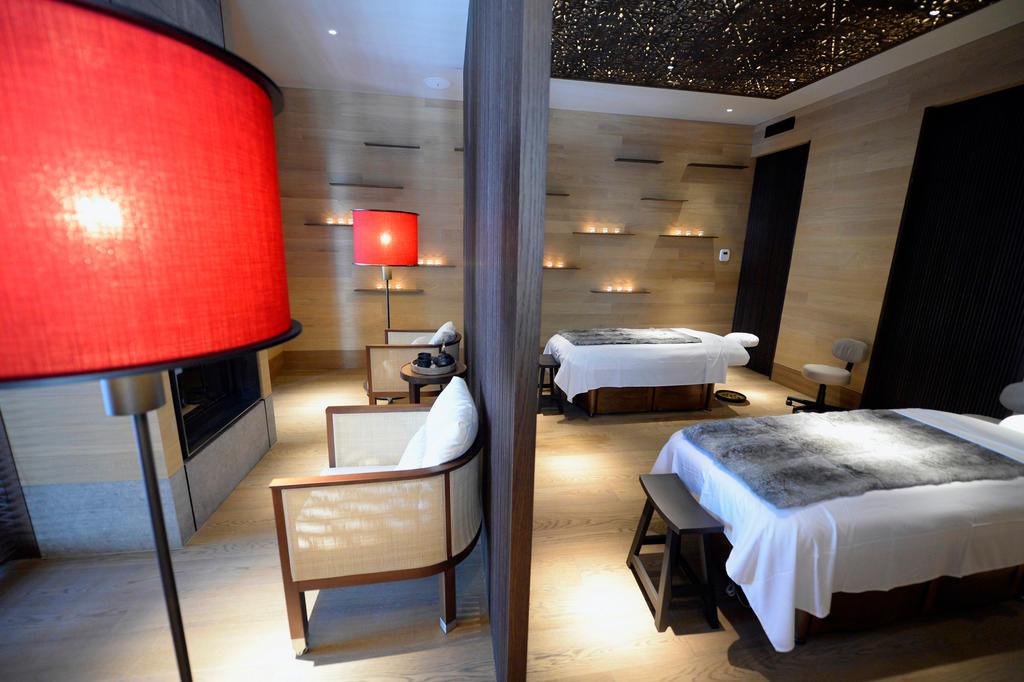Fast internet to bring digital nomads to Alps

This article on Switzerland you are about to read was actually written on the island of Bali, in Indonesia.
It wasn’t, but I confess that at times I get so bored with the Swiss alpine landscape, I would love to pack my bags, including laptop, phone, assorted cables and adapters, and settle in for a week or two at the ‘HubudExternal link’ co-working space – or hub – in the Balinese town of Ubud.
Whatever work we do, it is increasingly place-independent thanks to the virtual world in which we live. And I’m sure there are many people outside of Switzerland who are reading this article thinking how nice it would be to work here for a while.
That is the idea behind Hubud whose founders realised they could attract people from around the world – in their words, ‘creatives, techies, entrepreneurs and business folks, change makers, downshifters and truth-seekers’, looking for an inspiring place to lead their business, advance their start up, or base themselves.
And it could serve as a model for a Swiss alpine paradise.
“We live in a very hectic world. When working on certain projects, you need to put some distance between yourself and your first place of work,” Jon Erni tells me. Erni is a co-founder of the ‘mia Engiadina’ projectExternal link, which aims to attract digital nomads to his home valley, the Engadine, in Switzerland’s southeast.
Agile working
Both Hubud and mia Engiadina are trying to piggyback on a larger trend towards flexible and agile working conditions. Not only ‘creatives, techies’ and their like are able to work outside traditional office spaces. Large employers including the Canadian telecom, Telus, offer their staff the chance to work where and when they want, and most do. A study in the UKExternal link found that agile working improves employee satisfaction, increases productivity, and reduces costs.
Microsoft Switzerland, where Erni is a manager, is one such firm offering flexibility, and he envisages translating the win-win for employer and employee – whatever the company – into a win for his home region too.
(Digital divide: the red marker points to the Engadine town of Scuol where high-speed broadband is patchy, compared with the area indicated by the red square around Davos, home to the WEF meeting and many other conferences)
The Engadine, in particular the lower part, has most everything a visitor to the Alps desires: a chain of quaint villages strung like pearls along steep, verdant slopes. There is even a medieval castle thrown in. You can easily be tricked into believing this is the place where time has stood still. However, that’s one thing Erni realises has to change if digital nomads are to come.
That’s why he’s spearheading efforts to lay fibre optic cables throughout the valley to ensure fast internet speeds. As a place of work, he knows the Engadine’s inspiring scenery is not enough.
If successful, even on a modest scale, creating workspaces here could be a lifeline to the region by helping diversify an economy that is overly dependent on skiers and hikers. Visitors have been staying away in ever greater numbers, scared away by the high cost of holidaying in Switzerland.
Cla MoscaExternal link, a local consultant and former world champion snowboarder, is one of Erni’s partners. He believes mia Engiadina offers an insurance policy against another risk: snow-poor winters due to climate change. Otherwise, he says, there is no plan B.
The Engadine is not alone in offering potential for people looking for an inspirational environment in which to work. There are many alpine valleys with small tourist sectors and a handful of cottage industries. At best, their economies are fragile, so the need to diversify is great.
So near, yet so far
What they offer is a sense of remoteness without being too distant from urban environments or too far away to make the installation of infrastructure unaffordable. It’s less than three hours by car or train from the centre of Zurich to the Lower Engadine’s regional centre, Scuol.
It’s potential that Isabelle Behrens is well aware of. She founded Alpine Co-WorkingExternal link a year ago, with the aim of setting up a network of locations across the Alps for regular clients. She has joined the mia Engiadina team to show how to create spaces where people working on different projects from different companies can work alongside each other, interacting.
mia Engiadina is moving from a concept into an operational phase this month when its first workspaces are opened in Scuol.
Erni and his co-initiators intend to target clients in the greater Zurich area looking for an inspirational ‘third place’, as mia Engiadina sells itself. The first being the company premises and the second being the home.
Since high-speed broadband will make it more convenient to work from the Engadine, the Microsoft manager is also counting on convincing the many people who own holiday properties there to visit more often and stay longer. And, he believes, tourists will be able to knock off items from their office to-do lists as well, giving them every reason to extend their stays.
The efforts to accommodate digital nomads, wherever they want to go on the planet brings new meaning to a working holiday. On the downside, in future we may know no holiday without work.
Does your employer offer you flexible working conditions? Tell us about your experience.
Agile working – the challenges
Requires high levels of trust in workplace relationships
Requires new management skills to ensure teams work effectively
Data storage and security is an issue when employees work from a remote location, including the home
Remote workstations must be designed with health and safety, and ergonomics in mind
(source: enei – Agile Working. A Guide for EmployersExternal link)
Agile working – not for everyone
Depending on personality, only 44% of people considered to be an ‘influential’ type and who thrive in team environments felt agile working improved their productivity
Workers considered ‘conscientious’ – or perfectionists, liked the flexibility but are at risk of working long hours and burning themselves out
(source: enei – Agile Working. A Guide for EmployersExternal link)
Agile working – in praise of the office
Azeem Azhar of the Schibsted Media Group wrote recently in the Financial TimesExternal link: “…withdrawing into the home office without interruptions has advantages, not least that you can think deeply through a problem without being interrupted. But the structure, rigour and discipline of systematised collaboration in a team are a prerequisite to much work.”
“So, agile working by itself might not lead to agile thinking. Water-cooler disruptions can be annoying but they can also be creative. Workspaces can be oppressive, but a nomadic style that masquerades as agile work may lead to procrastination and thinking blocks. Regular encounters between colleagues in a safe space that is professional and nurturing can be the most productive. We call these offices.”

In compliance with the JTI standards
More: SWI swissinfo.ch certified by the Journalism Trust Initiative




You can find an overview of ongoing debates with our journalists here. Please join us!
If you want to start a conversation about a topic raised in this article or want to report factual errors, email us at english@swissinfo.ch.